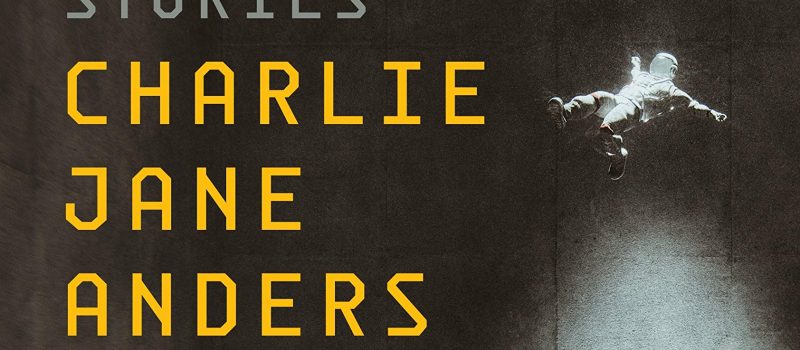Gary K. Wolfe Reviews Even Greater Mistakes by Charlie Jane Anders
 Even Greater Mistakes, Charlie Jane Anders (Tor 978-1250766502, $27.99, 352pp, hc) November 2021.
Even Greater Mistakes, Charlie Jane Anders (Tor 978-1250766502, $27.99, 352pp, hc) November 2021.
It’s probably a peculiarity of my own, but I’ve always found the acknowledgements in books fascinating – not the simple copyright listings, but the part that pays tribute to mentors, colleagues, friends, students, partners, pets, agents, editors, and various other literary and nonliterary influences. They offer a context reminding us that each book represents a unique confluence of cultural and personal vectors. In the acknowledgements to Even Greater Mistakes, Charlie Jane Anders’s first major collection (the more modest Six Months, Three Days, Five Others a few years ago contained only six stories), Anders mentions her agent Russ Galen not only for championing “a honking big book of my stories,” but using it “to showcase the full range of my writing here, rather than playing it safe and sticking to stories that had appeared in ‘year’s best’ SF anthologies.” That was good advice, but of course it led me to track down maybe a half-dozen stories which had been so anthologized but which aren’t in the present collection. I’m not interested in second-guessing whether they should have been, because what this tells me is that Anders has wisely avoided the temptation to assemble a “greatest hits” album in favor of showing us the shape of her career as she views it. It’s a very interesting shape, more complex than might be expected by readers familiar only with her novels.
Not that there aren’t some pingbacks to those novels. “If You Take My Meaning” is a kind of direct sequel to The City in the Middle of the Night, and while it stands perfectly well on its own as a story of alien contact, it’s good to be reminded of how strong the characters of Sophie, Alyssa, and Mouth were. “Clover” borrows characters from All the Birds in the Sky, most prominently a cat left behind and now adopted by a gay couple working through some issues of their own. “A Temporary Embarrassment in Spacetime” doesn’t really share the narrative world of Victories Greater than Death, but does share its kind of frenetic, anything-goes space opera sensibility, complete with Douglas Adams-style alien names (the Marquis of Bloopabloopasneak?), a pair of lovable outlaw rogues, and even a petulant talking superweapon out of Dark Star.
The more important takeaway from Even Greater Mistakes is that Anders’s work isn’t necessarily defined by those novels or their worlds; I was a bit surprised, for example, that only one story other than those mentioned above was set in space; “Love Might be Too Strong a Word” takes place on a starship with a posthuman population representing a bewildering array of genders, pronouns, and body forms; it may be the most inventive story in the book, but also the most disorienting, with sentences like “Dailys, like me, are pretty much the only dar the boides can man…. I’ve heard the boides can man the spirers, too, but it probably doesn’t happen much.” While Anders seems more interested in this society than the mission of the starship, at times she draws the camera back and implies a larger mise en scene that almost evokes a multigendered Cordwainer Smith.
If settings are often a colorful backdrop for stories whose main focus is elsewhere, there are some themes that Anders repeatedly circles around, as if trying to test different angles of vision. It’s not surprising that the idea of an American dystopia should emerge as a recurring theme during the past decade, but Anders approaches it in three distinct ways. In “The Bookstore at the End of America”, a liberal California has split off from an increasingly repressive America, the titular bookstore balanced on the boarder, with one entrance from each side. While Anders’s version of California exceptionalism might be a bit less convincing than the nitwit Trumpism of the rest of the country, the story manages to end on an almost optimistic note, celebrating the unifying magic of bookstores. “Rock Manning Goes for Broke”, really three stories woven into a novella, offers an even more grim America, with a homegrown fascist movement, a collapsed economy, food and credit riots, an out-of-control opioid epidemic, a reinstated military draft, frightening new superweapons, and an almost powerless federal government. Her tone here at times approaches slapstick; Rock himself, the son of a once-famous movie stuntman, begins making outrageous stunt videos with his pal Sally Hamster, videos which eventually become viral sensations before getting politicized. The comic sensibility here is at best Chaplinesque, if you could imagine The Great Dictator or Modern Times remade as Jackass episodes. But with the Sturgeon Award-winning “Don’t Press Charges and I Won’t Sue”, Anders moves into full body-horror mode, in a nightmare scenario of what might happen to gender minorities if a repressive state somehow medicalizes radical intolerance with a procedure – portrayed in harrowing detail as its main character finds their mind being transferred to that of a male corpse – designed to turn them into “healthy, well-adjusted individuals… without any trace of dysphoria, dysmorphia, dystonia, or any other dys-words.” It’s by far the most powerful and disturbing story in the book.
While environmental issues often lurk in the background of Anders’s stories, the two that most directly focus on them both deal with future San Francisco, as part of an unfinished cycle of stories about queer Bay Area life, most to have been set in the present with presumably little or no fantastic content. On the basis of “My Breath is a Rudder” and “Because Change Was the Ocean and We Lived by Her Mercy”, I’d be curious to know what sort of continuity Anders had in mind. (Doris Lessing did something similar when her mostly realistic Children of Violence series moved seamlessly into the future with its final volume.) Set in a reasonably near-term San Francisco, “My Breath is a Rudder” is nominally concerned with a mural artist trying to decide on a design for a section of an immense seawall built to protect the city, but a popular augmented reality game which allows the wearer to experience any number of iterations of the city’s history, from the 1906 fire, to the Summer of Love, to futuristic fantasies, gives the tale a sense of historical depth. “Because Change Was the Ocean and We Lived by Her Mercy” could almost be one of those virtual San Franciscos. In a more distant future, the city has become a drowned archipelago, and Fairbanks is the west’s megacity. Not only has the environment been devastated, but a “dataclysm” has wiped out much of the old world’s information and culture, leaving room for the narrator to join a not-very-good band called the Wrong-Headed Kids. Between some haunting images of the underwater city, the narrator’s own quest to find a meaningful community, and the suggestion that the ocean has slowly begun to heal itself, the story makes up in hope what it lacks in clear focus. In a sense, “This is Why We Can’t Have Nasty Things” also belongs in this group of San Francisco stories, since it shares with them an acute sense of loss, even though it’s essentially a mainstream story involving the closing of a landmark gay bar as a result of gentrification.
Another topic that fascinates Anders – not surprisingly for an SF writer – is time, and not just time travel. Anders clearly recognizes that all fiction manipulates time, and she literalizes this in two of her strongest character studies. The Hugo Award winning “Six Months, Three Days” succinctly states its premise with its opening line: “The man who can see the future has a date with the woman who can see many possible futures.” That’s a tempting conceit, even though it actually involves types of clairvoyance rather than SF handwaving, but that isn’t Anders’s point; she uses the device to explore the implicit paradoxes of any relationship in which the two principals cannot truly share a view of the future – which, when you think about it, is just about any relationship. The unflinching insight into the mostly sympathetic characters of Doug and Judy are what earned the story its Hugo. In “Power Couple”, the time device is a bit more contrived, since it involves an unlikely pact between a student preparing for med school and another preparing for law school. Fearing they might break up under the stresses of professional school, and given the convenient development of consumer cryogenics, they agree to take turns sleeping for seven years – not in a cryo facility, but in a weird kind of chrome coffin you keep plugged in at home – so that each can become a success before they settle in together. Although I couldn’t quite get past the sheer goofiness of the idea, again Anders’s sharp delineation of her main characters makes the inevitable denouement moving.
The one story in the book for which I feel almost irrationally grateful is “The Time Travel Club”, which begins with another rather ragtag community of dreamers, but soon asks a perfectly reasonable question that surprisingly few writers ever bother with: as she says in her story note: “if you could travel in time, wouldn’t you also be relocated in space?” Given the motion of the Earth, the sun, the galaxy, etc., this seems an obvious problem for time-travel tales. Anders works this out in a bit more detail than the story actually requires (it’s essentially another group character study, plus a wonderful burnt out ex-physicist), but it leads to a surprisingly warm conclusion.
As with the clairvoyance in “Six Months, Three Days”, “The Time Travel Club” is basically fantasy despite those calculations; time travel, after all, is usually fantasy choreography in SF costumes. But a handful of stories are direct fantasies, involving genies, vampires, werewolves, zombies, the afterlife, and magical godmothers. The lead story, “As Good As New”, is one of the best examples of Anders’s skill at using familiar materials in unexpected ways; part Twilight Zone episode, part folk fantasy, and part writer’s-block parable, it concerns Marisol, an aspiring playwright who, hidden away in the absurdly well-supplied panic room of a mansion she’d been cleaning, finds herself the last woman on Earth after a mysterious fungus destroys almost everything in its path. Venturing outside, she finds a bottle with a genie, who in a former life was a theatre critic. The story weirdly pivots into a logical puzzle – how to construct three wishes that won’t backfire as they always do in such stories – and Marisol’s sorting out her problems with the play she’s writing. Another wish-fulfillment variation is the comparatively slight “The Visitmothers”, who might be aliens or fairies, but who show up at random times to grant wishes. “Fairy Werewolf vs. Vampire Zombie”, a title that sounds like someone lost a bet, turns out less whimsical than the title suggests, grounding its conceits by setting the whole thing in a magical underground bar, one of many such out-of-the-way bars in Anders’s fiction (they show up in nearly half the stories here, and get a collective elegy in “This is Why We Can’t Have Nasty Things”, mentioned earlier). “Captain Roger in Heaven” is another group portrait, initially focusing on several members of a kind of sex cult that sounds like a cross between a less toxic Nxivm and Wilhelm Reich’s orgone energy accumulators, but veering uncertainly into an afterlife satire, as a magical technology called “Visualizers” reveals who gets into heaven or hell. (The surprise shift toward a fundamentalist perspective recalls Ted Chiang’s “Hell is the Absence of God”). “Ghost Champaign” combines the supernatural with Anders’s fascination with time, as the protagonist is haunted from the future by her own posthumous self; the story’s real strength, though, is the bitter but sympathetic voice of the narrator, a stand-up comic. Surprisingly, there’s not much actual humor in the story, even though elsewhere Anders can be a master of stand-up one-liners and zingers. Finally, “Rat Catcher’s Yellows” uniquely seems to represent Anders’s capacity for managing apparently contradictory tonalities; essentially a love story, its narrator is trying to take care of her wife Shary, who is suffering from premature dementia caused by a brain disease. When Shary reluctantly agrees to try out a popular online game called Divine Right of Cats, she unexpectedly becomes a master player. Anders’s sensitive treatment of a tragic plight is balanced by her apparent delight in the comical political intrigues of the warring cat kingdoms. Like some other of the stories here, it combines a deep love for her characters with the occasional reminder that sometimes, even in the face of bleak realities, girls just want to have fun.
Gary K. Wolfe is Emeritus Professor of Humanities at Roosevelt University and a reviewer for Locus magazine since 1991. His reviews have been collected in Soundings (BSFA Award 2006; Hugo nominee), Bearings (Hugo nominee 2011), and Sightings (2011), and his Evaporating Genres: Essays on Fantastic Literature (Wesleyan) received the Locus Award in 2012. Earlier books include The Known and the Unknown: The Iconography of Science Fiction (Eaton Award, 1981), Harlan Ellison: The Edge of Forever (with Ellen Weil, 2002), and David Lindsay (1982). For the Library of America, he edited American Science Fiction: Nine Classic Novels of the 1950s in 2012, with a similar set for the 1960s forthcoming. He has received the Pilgrim Award from the Science Fiction Research Association, the Distinguished Scholarship Award from the International Association for the Fantastic in the Arts, and a Special World Fantasy Award for criticism. His 24-lecture series How Great Science Fiction Works appeared from The Great Courses in 2016. He has received six Hugo nominations, two for his reviews collections and four for The Coode Street Podcast, which he has co-hosted with Jonathan Strahan for more than 300 episodes. He lives in Chicago.
This review and more like it in the November 2021 issue of Locus.
 While you are here, please take a moment to support Locus with a one-time or recurring donation. We rely on reader donations to keep the magazine and site going, and would like to keep the site paywall free, but WE NEED YOUR FINANCIAL SUPPORT to continue quality coverage of the science fiction and fantasy field.
While you are here, please take a moment to support Locus with a one-time or recurring donation. We rely on reader donations to keep the magazine and site going, and would like to keep the site paywall free, but WE NEED YOUR FINANCIAL SUPPORT to continue quality coverage of the science fiction and fantasy field.
©Locus Magazine. Copyrighted material may not be republished without permission of LSFF.








